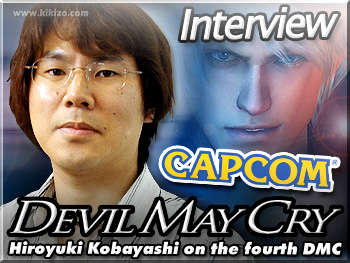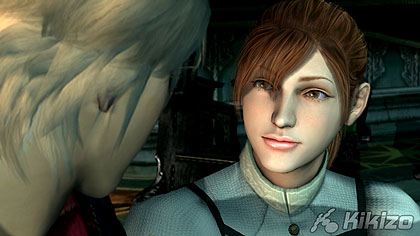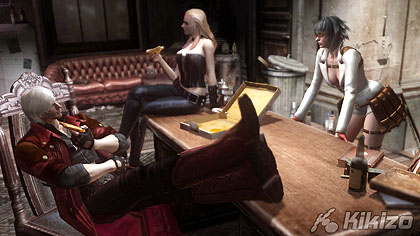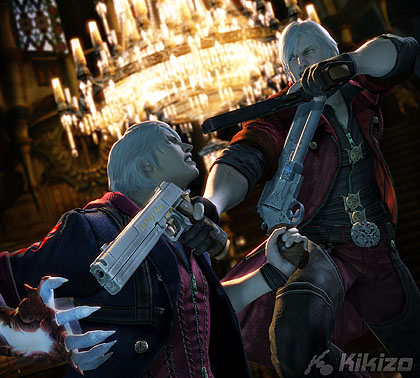Devil May Cry 4: Kobayashi Interview
We start the year with Capcom's Hiroyuki Kobayashi, for a detailed chat about one of the first big games of 2008.
By Adam Doree
One of the first big games of 2008 has to be Devil May Cry 4, coming this February from Capcom. We recently met with Hiroyuki Kobayashi, the game's producer, for a detailed chat about the series' next-gen gothic world, new protagonist Nero and his powerful new techniques, and much more besides.

Kobayashi is quick to point out that, although massive releases like Ninja Gaiden, God of War and Heavenly Sword are all big names that are very similar, Devil May Cry was here first, and he's here to tell you why Capcom thinks it's still best.
And the fourth game in the series, Kobayashi-san promises, will be the most engrossing to date, while at the same time revitalising the series with a new central character and the return of familiar faces.
![]()
Kikizo: All of the games in the series have received critical acclaim, so was there any central criticism that you wanted to really improve for Devil May Cry 4?
Kobayashi: One thing is that I didn't work on DMC3 myself. But everyone said that it was very difficult. So this time around, I didn't want to throw in a big game to the market and just hope for the best; obviously the difficulty level is comparable to that of DMC3, but we put a step-by-step guide for the users to actually reach that skill level. Another thing that is new to the series that I wanted to make, is to put in lots of new actions and techniques, so this really benefits DMC4.
Kikizo: Can you tell us a bit more about these new actions and techniques? Which improvements are you most satisfied with?
Kobayashi: The main difference is a new weapon, the Devil Bringer, which is your right arm, so the player now has guns, swords and the Devil Bringer, and all of these can be brought together for combination attacks. This is probably the largest difference since the previous title, and I am quite happy about how it came out. Another great weapon is the Lucifer which is a very unique bladed weapon. Another thing, and this a small thing maybe, but the transition is very smooth as you go backwards and forwards in the game, which is something I am quite happy with.
Kikizo: It's getting a bit dull to ask about differences between PS3 and Xbox 360 these days, but people always seem to be interested. Unlike most releases that end up on both consoles, development initially led on PS3 for this game. So please can you tell us about the decision to abandon PS3 exclusivity and also how this affects any differences in terms of visuals, control, and storage media on the different versions?
Kobayashi: Firstly, about the decision to make multiple versions, we have to understand that the market with next generation consoles is becoming a little more complex than we had anticipated, and it is particularly interesting in Europe. Where PS3 may be performing well in one territory it may not be so strong in another. We really just wanted to get the broadest market possible with this game, which is why we decided to make it on the Xbox 360 and PC as well. As for the comparison of the versions, essentially the contents are the same.
What we actually did in the beginning was create it for PC, and then translate this to PS3 and Xbox 360 versions. Because of the slightly different performance of the two consoles, it might come out slightly different, perhaps the video image will vary, or the feel of the controller may be different. If you are familiar with the PS2 or PS3 controller you may feel it is a little bit different on the 360, only because the buttons feel different or whatever. Also rumble vibration feedback will be included in both. We are doing things with Achievements on the 360 version of course. We didn't have any difficulty on any particular console and they basically play the same.
Kikizo: Actually, the PC version of Lost Planet from Capcom supports DirectX 10, providing better looking fur, for example. Is that going to be the case with the PC version of DMC4?
Kobayashi: We hadn't decided which graphics board we wanted to focus on until quite recently, so any fine details will be discussed in due course - certainly we will be chasing stunning visuals, and therefore looking at high-spec PC configurations. It would be fair to say that we are focussing on the PS3 and Xbox 360 versions most right now and will then go back to focussing on the PC build.
Kikizo: How did you approach next-gen titles like DMC4 in terms of the Capcom game engine, because so many other studios are opting to use thirdparty engines now?
Kobayashi: Basically we prepared for the next-gen early. We researched about a game engine for next-gen consoles in the early stages, we completed that research well before starting to create games, and so the engine that we have is used for many Capcom titles like Devil May Cry 4, as well as Lost Planet and Resident Evil. I don't know if that's a secret or not!
Kikizo: You have previously stated that DMC4 will feature more weapons, manoeuvres, enemies, locations, music AND cut-scenes than ALL of the previous games combined! That seems like a huge amount of work, how have you achieved this?

Kobayashi: In has been a challenging process to include all of this content. In creating the game as a whole, we have certainly increased the effort into each one of those aspects. Having said that, the storyline is much more substantial than in the previous games, it is very rich. We wanted a more story-heavy game because of the new character, we wanted to build Nero as a character, and we use Dante to do this. Dante starts out as an enemy, but as things evolve Dante starts to offer guidance and Nero becomes more confident.



















 Satoru Iwata Video Interview - the late Nintendo president spoke with Kikizo in 2004 as 'Nintendo Revolution' loomed.
Satoru Iwata Video Interview - the late Nintendo president spoke with Kikizo in 2004 as 'Nintendo Revolution' loomed. Kaz Hirai Video Interview - the first of Kikizo's interviews with the man who went on to become global head of Sony.
Kaz Hirai Video Interview - the first of Kikizo's interviews with the man who went on to become global head of Sony. Ed Fries Video Interview - one of Xbox's founders discusses an epic journey from Excel to Xbox.
Ed Fries Video Interview - one of Xbox's founders discusses an epic journey from Excel to Xbox. Yu Suzuki, the Kikizo Interview - we spend time with one of gaming's most revered creators.
Yu Suzuki, the Kikizo Interview - we spend time with one of gaming's most revered creators. Tetris - The Making of an Icon: Alexey Pajitnov and Henk Rogers reveal the fascinating story behind Tetris
Tetris - The Making of an Icon: Alexey Pajitnov and Henk Rogers reveal the fascinating story behind Tetris Rare founders, Chris and Tim Stamper - their only interview? Genuinely 'rare' sit down with founders of the legendary studio.
Rare founders, Chris and Tim Stamper - their only interview? Genuinely 'rare' sit down with founders of the legendary studio. The History of First-Person Shooters - a retrospective, from Maze War to Modern Warfare
The History of First-Person Shooters - a retrospective, from Maze War to Modern Warfare